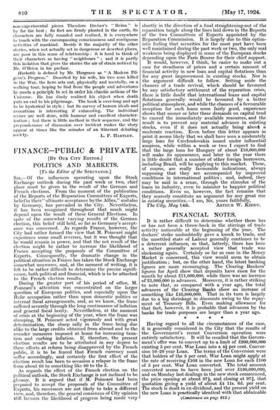FINANCE-PUBLIC & PRIVATE.
[BY OUR CITY EDITOR.] POLITICS AND MARKETS. [To the Editor of the SPECTATOR.] SIR,—Of the influences operating upon the Stock Exchange outlook during the past week or two, chief place must be given to the result of the German and French elections. From the moment of the publication of the Reports of the Reparation Committees of Experts, belief in their " ultimate acceptance by the Allies," and also by Germany, has prevailed in the City. Nevertheless, it has been recognized throughout that much might depend upon the result of these General Elections. In spite of the somewhat varying results of the German election, this belief still held, so far as Germany's accept- ance was concerned. As regards France, however, the City had rather formed the view that M. Poincare might experience some small reverses, but it was thought that he would remain in power, and that the net result of the election might be rather to increase the likelihood of France accepting the proposals of the Committee of Experts. Consequently, the dramatic change in the political situation in France has taken the Stock Exchange somewhat unawares, and, at the moment of writing, it is felt to be rather difficult to determine the precise signifi- cance, both political and financial, which is to be attached to the French election results.
During the greater part of his period of office, M. Poincare's attention was concentrated on the larger question of European politics, and especially upon the Ruhr occupation rather than upon domestic politics or internal fiscal arrangements, and, as we know, the franc suffered severely through the long continuance of inflation and general fiscal laxity. Nevertheless, at the moment of crisis at the beginning of the year, when the franc was slumping, M. Poincare acted vigorously and with great determination, the sharp rally in the franc being due alike to the large credits obtained from abroad and to the sounder measures imposed at home for increasing taxa- tion and curbing inflation. If, therefore, the present election results are to be attributed in any degree to these efforts at reform being disapproved by the French public, it is to be feared that French currency must suffer accordingly, and certainly the first effect of the election result has been to occasion a relapse in the franc from about 68 to something like 80 to the £. As regards the effect of the French election on the political outlook, the Stock Exchange is not inclined to be gloomy. It is argued that if M. Poincare had been prepared to accept the proposals of the Committee of Experts, his successors are not likely to take a different view, and, therefore, the general consensus of City opinion still favours the likelihood of progress being made very shortly in the direction of a final straightening-out of the reparation tangle along the lines laid down in the Reports of the two Committees of Experts appointed by the Reparation Commission. It is largely due to this optim- istic feeling that securities for the most part have been well maintained during the past week or two, the only real weakness being displayed in some of the European stocks depending upon the Paris Bourse for their chief support. - It would, however, I think, be easier to make out a case for steadiness of prices and a certain amount of financial activity in new loan and capital flotations than for any great improvement in existing stocks. Nor is the argument difficult to follow. Setting aside the chances of a trade revival, which should be favoured by any satisfactory settlement of the reparation crisis, there is little doubt that international loans and capital flotations generally would be favoured by a better political atmosphere, and while the chances of a favourable reception for such loans seem fairly good, experience shows that sooner or later these demands on capital tend to exceed the immediately available resources, and the result is to prevent any material advance in existing stocks, even if it does not actually bring about a moderate reaction. Even before this letter appears in print it seems likely that we shall have seen a moderately large loan for Czechoslovakia issued under influential auspices, while within a week or two I expect to find that the large loan for Hungary of about £10,000,000 will make its appearance, and later in the year there is little doubt that a number of other foreign borrowers, including Brazil, will be applying to this market. These, of course, are really favourable indications, always supposing that they are accompanied by improved conditions in international politics ; and, indeed, they may be said in a sense, through the stimulus of the loans to industry, even to minister to happier political conditions. Even so, however, the fact remains that they scarcely constitute an argument for any great rise in existing securities.—I am, Sir, yours faithfully,


















































 Previous page
Previous page